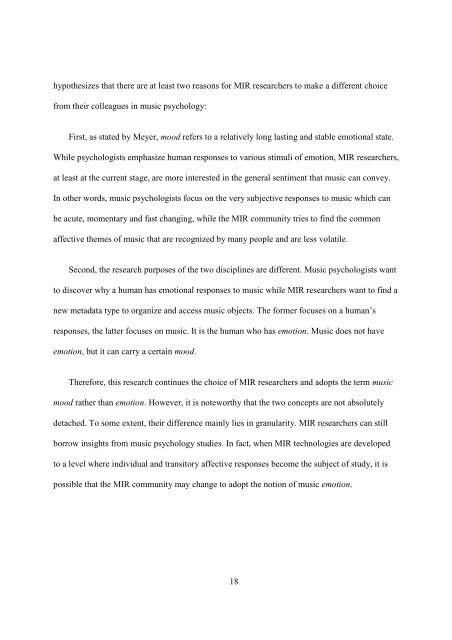improving music mood classification using lyrics, audio and social tags
improving music mood classification using lyrics, audio and social tags
improving music mood classification using lyrics, audio and social tags
You also want an ePaper? Increase the reach of your titles
YUMPU automatically turns print PDFs into web optimized ePapers that Google loves.
hypothesizes that there are at least two reasons for MIR researchers to make a different choice<br />
from their colleagues in <strong>music</strong> psychology:<br />
First, as stated by Meyer, <strong>mood</strong> refers to a relatively long lasting <strong>and</strong> stable emotional state.<br />
While psychologists emphasize human responses to various stimuli of emotion, MIR researchers,<br />
at least at the current stage, are more interested in the general sentiment that <strong>music</strong> can convey.<br />
In other words, <strong>music</strong> psychologists focus on the very subjective responses to <strong>music</strong> which can<br />
be acute, momentary <strong>and</strong> fast changing, while the MIR community tries to find the common<br />
affective themes of <strong>music</strong> that are recognized by many people <strong>and</strong> are less volatile.<br />
Second, the research purposes of the two disciplines are different. Music psychologists want<br />
to discover why a human has emotional responses to <strong>music</strong> while MIR researchers want to find a<br />
new metadata type to organize <strong>and</strong> access <strong>music</strong> objects. The former focuses on a human’s<br />
responses, the latter focuses on <strong>music</strong>. It is the human who has emotion. Music does not have<br />
emotion, but it can carry a certain <strong>mood</strong>.<br />
Therefore, this research continues the choice of MIR researchers <strong>and</strong> adopts the term <strong>music</strong><br />
<strong>mood</strong> rather than emotion. However, it is noteworthy that the two concepts are not absolutely<br />
detached. To some extent, their difference mainly lies in granularity. MIR researchers can still<br />
borrow insights from <strong>music</strong> psychology studies. In fact, when MIR technologies are developed<br />
to a level where individual <strong>and</strong> transitory affective responses become the subject of study, it is<br />
possible that the MIR community may change to adopt the notion of <strong>music</strong> emotion.<br />
18
















